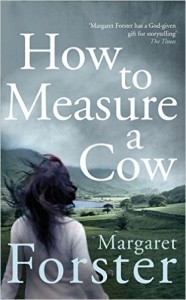 Published by Chatto & Windus 3 March 2016
Published by Chatto & Windus 3 March 2016
256pp, hardback, £14.99
Reviewed by Alison Burns
Much-loved novelist, memoirist and biographer Margaret Forster, who died last month, was known for her ability to get under the skin. Here, in her final novel, she tells the story of a woman driven to murder.
When Tara Fraser leaves London for a new life on the Cumbrian coast, she does so on a whim – and with a new, duller identity. Ten years in prison, and the crime that put her there, have left her without friends or family. Under an assumed name, Sarah Scott, she finds lodgings in an anonymous house in a dreary street, and mundane work in a local factory. Her neighbour, Nancy Armstrong, an older woman who also keeps herself to herself, cannot quite make her out.
Bit by bit, as the two women circle around each other and local people talk, we learn that Tara was fostered from the age of three, became a teenage celebrity when she saved a child from drowning, studied chemistry, married a smooth older man with a sports car, and killed him. At the time, she was working in a laboratory.
Tempted by letter to attend a reunion of her closest school friends down south, Tara/Sarah – who has been stifling her true personality – lets her hair down (hair that, when loose, is red and curly). She is angry with these friends, who did not support her at her trial. Through their eyes, however, we piece together a portrait very different from the self she has been projecting and begin, uncomfortably, to see her as a cold-hearted schemer.
Back in Workington, Tara/Sarah gives in her notice and looks for a new place to live, where she can be more herself. At this, she loses the backing of her rehabilitation support team and upsets Nancy, who has been trying to be her friend. When Tara/Sarah is seriously injured in a car-crash, Nancy is the only person she can turn to.
The denouement of this story exposes Tara/Sarah’s personal history in more detail. This woman who talks of reigniting her old self ‘from a bed of ash’ was the child of a heroin addict. In her youth she was manipulative and given to tantrums – ‘she made herself up all the time’. She tested the patience of her foster parents and friends, who nonetheless, at some level, did not entirely give up on her.
This last novel by the author of Georgy Girl is an altogether unusual take on dysfunction. By the end of it, even the reader is still somewhat on Tara’s side. Forster’s knack of getting inside her characters heads works particularly well in the contrast between the thoughts of the woman-in-hiding and the thoughts of the person closest to her, Nancy. Through their prickly association, founded on loneliness rather than anything in common, Forster intensifies the gripping effect of Tara’s struggle. If the BBC is looking for another uncomfortable TV drama series to follow its recent riveting Dr Foster, they should consider this.
